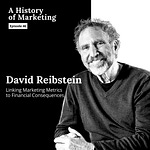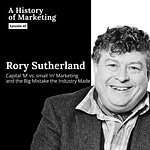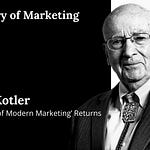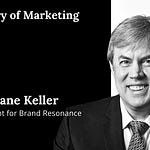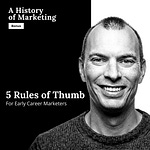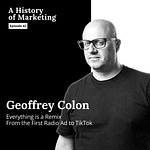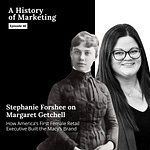A History of Marketing / Episode 33
This week I'm sharing an excellent conversation with Russell W. Belk, Professor and Kraft Foods Chair in Marketing at York University.
Professor Belk is recognized as a leading expert on consumption, materialism, collecting, and sharing. In 1988 he published “Possessions and The Extended Self,” one of the most widely cited papers in the field of consumer research.
The Extended Self is a simple but compelling idea that, “You are what you own.” That possessions become extensions of our identities. Of course, this has massive implications for marketing.
We spend most of our conversation exploring The Extended Self. We look at how luxury brands have leaned into the phenomenon. We discuss the relationship between marketing and materialism. We also explore how The Extended Self has adapted in the age of social media and streaming digital media that we subscribe to but don’t own.
Listen to the podcast: Spotify / Apple Podcasts / YouTube Podcasts
More from Russell Belk:
Shoutouts:
Laura Ries, whom I spoke with on podcast episode #19, released an excellent new book: The Strategic Enemy. Find it wherever books are sold.
Thank you to Xiaoying Feng, a Marketing Ph.D. Candidate at Syracuse, who volunteers to review and edit transcripts for accuracy and clarity.
Andrew Mitrak: Russ Belk, welcome to A History of Marketing.
Russell Belk: Thank you.
Andrew Mitrak: Well, I'm looking forward to a conversation about your work and your career, but I thought I'd start right at the beginning. What initially drew you to marketing and researching consumption and consumer behavior?
Russell Belk: My father went to art school and got into advertising. And I can remember these dinner table conversations: “Can advertising really do that to people?” The Hidden Persuaders by Vance Packard had come out, and I think that was a topic of one of our conversations, or probably more than one. And so that's stuck in the back of my mind. And I wandered over to business and started taking some classes and found that there was something congenial there and something challenging there, even though I regarded most of what I was hearing in the classroom as a load of rubbish. But which I think was a healthy take. But ultimately, I found some ways of getting through the program and finding things that interested me.
Andrew Mitrak: Hidden Persuaders has come up a lot on this podcast. So it's a thing that I think inspired a lot of people.
Bringing Anthropology, Psychology, and Sociology to Consumer Research
Andrew Mitrak: Now, you eventually went on to earn your PhD in marketing. And when I think of your work on consumption, consumer behavior, materialism, and what would go on to be the extended self, it feels like a new jumping-off point that's not just marketing. You know, it mixes anthropology and psychology and sociology. So when did that line of research come up? Was that while you were getting your marketing PhD?
Russell Belk: No, it took almost 10 years for me to get there. All of my training was in psychology, basically, and that was the name of the game: doing experimental psychological research at the time. I never had a course in sociology or anthropology, and so that was self-taught.
And I was interested in things including gift-giving and collecting as initial topics, and they didn't lend themselves very well to experimentation, as you can well imagine. I had been researching gift-giving, in particular, by reading a lot of anthropology and sociology, and eventually, the methods began to at least accumulate as a possibility for me. And then I put together this thing along with Melanie Wallendorf called the Consumer Behavior Odyssey, and that was a jumping-off place for a number of us to get into more anthropological and sociological topics.
The Origin Story of "Possessions and the Extended Self"
Andrew Mitrak: After the Odyssey, you published one of your best-known works, and that's "Possessions and the Extended Self." And when I look this up on Google Scholar, it shows nearly 17,000 citations. It's a widely cited work and really influential. Can you share the story of writing this paper and the initial reaction to it when you published it?
Russell Belk: Well, I think in retrospect, it goes back to my going off to university and finding that there were a lot of wealthier people than those that I'd gone to high school with. And so I became a little bit disaffected with the lifestyles of the rich and famous, if you will. And so, coming into it, trying to understand what possessions meant was the basic thing I wanted to do with my research.
So this thing that the paper came out of was originally going to be a book. And one of the chapters of that was on materialism, and about the same time, I sent off an article on materialism that was from my old psychological days, and it developed a scale of materialism and some conceptual work. And another part of it was this notion of the extended self.
Russell Belk: The way I used to do research in a pre-Google era was I would go to the library of the university once or twice a year, and I would go through all of the current journals, including law and medicine and all the fields. And if there was something interesting in the table of contents, I'd have a look at it. If it seemed to warrant it, I'd make a copy and bring it back.
But one of the things that I found that was really fortuitous was William James's work. And he really talked about—well, he didn't use that term—the extended self. "A man is all that he can call his" is a quote that I'd taken from him. And I also happened to be reading some of his brother Henry James's work and found that the themes that Henry James talked about in fiction were similar to some of the things that William James was talking about in psychology. And so those were among the pieces. I tend to read quite broadly, and so I took advantage of a number of different types of evidence or research in trying to pull that thing together.
Why “The Extended Self" Resonated
Andrew Mitrak: When I was reading about The Extended Self to prep for this, everything to me felt obviously true. And I'm wondering, is that just a bias in hindsight that, it's been around 40 years, it's been so influential, it's more commonly known? Or was it more that you were articulating something that everybody felt was true but hadn't quite been conceptualized and articulated in the way that you phrased it and the way that you kind of packaged up the paper?
Russell Belk: Well, I think I pulled together a bunch of threads, but William James was writing in 1890, and so the ideas that are critical to it aren't new at all. It's been recognized for some time. I think I maybe systematized it a little bit. I played out the implications a bit and looked at things like burglaries and loss and harm to possessions and so forth. And so I think I did something with the concept rather than just reiterating common sense, hopefully. But yeah, in hindsight, hopefully, this has become a more pervasive and accepted concept today.
Of course, as we become a more gadget-oriented, materialistic society, there's reason to go back and look at these things. And also, as we become less materialistic, as we dematerialize now.
Is “the Extended Self” Innate or Culturally Learned?
Andrew Mitrak: So you mentioned the history of these ideas, that they're not necessarily new ideas, but do you think that the core concept of the extended self—that we're not just our body and minds, that our possessions aren't just external objects, they're an extension of our own identity—do you feel like this is something that's biologically ingrained in what it means to be human? Or is it something that's more learned culturally? Are there cultures where this isn't the case, or is it true around the world?
Russell Belk: No, it's not completely true around the world, and it's not biologically ingrained. It is cultural. And so if you look at Aboriginal Australians, until a generation or two ago, they were nomadic. And if you're nomadic, it is a burden to have possessions. And so, rather than having my spear and your spear, if I want to go out and hunt wallaby or kangaroo, I just pick up a spear that is in the community, take it out, use it, and bring it back. And rather than each person carrying spears and shields and other things, it makes sense to not be very materialistic.
There are, from different vantage points, religious groups who are anti-materialistic. I had a student at one point who studied Catholic seminaries. And there was one where the priests—and it was all male—would switch cells (they were called cells) periodically so they wouldn't get accustomed to a particular point of view and see that as their possession. One of them had a letter from his sister that he put under his mattress and kept and felt terribly sinful for doing that. And this was a simplistic, a simplifying ethos, rather. And so, yes, there are cultures, and I would say that these are learned relationships. And now we're learning to get by with less in terms of physically owned possessions. And so that, too, is maybe pointing us in the direction of dematerializing and becoming less materialistic, in at least that physical object sense.
Andrew Mitrak: Yeah, I'm sure. Well, let's put a pin in that because I'll come back to the idea of both dematerialization but also digitization and the extended self online, which is a really interesting area you've written about.
The Role of Marketing in the Rise of Materialism
Andrew Mitrak: But coming back to the history of this idea, at least in America or Western culture, I've heard people that I disagree with kind of describe, "Oh, our materialism is all just marketing," that these marketers came around and Edward Bernays and others, they placed this idea that we have to have better stuff and we have to start replacing things. And I don't—well, I think marketing probably has some impact, I don't think it's quite that simple that, hey, we're materialistic because marketers tell us to be materialistic. But there are probably points where marketing has shaped it somewhat or has increased the idea of a brand perception, or I'm a Cadillac person versus a Ford person, or things like that. So what do you think of the inflection points of it becoming more pronounced and culture becoming more materialistic, and how did marketing and promotion play a role in that?
Russell Belk: Well, yeah, I think marketing has had a role in exacerbating these tendencies, but it didn't create them. I wrote a book on collecting, and collecting is something that we find evidence of in prehistoric burial sites. For example, we'll find evidence of people's possessions being buried with them, that there's that degree of attachment that the attachment even lasts after death. Collections of interesting pebbles or iron pyrites or whatever it might be. So I don't think that notion of possessing things and, presumably—although it's prehistoric—extending ourself into them is anything new.
But definitely marketing, you know, starting at least with the Industrial Revolution, has done things to encourage people to buy more things more frequently. There's a French Annales school. And one of the books is looking at prehistoric—well, not just prehistoric, but actually 17th, 18th century. This is Fernand Braudel. Possessions of peasants in the 17th, 18th century, and they would have a change of clothes, they would have maybe a pot and a pan, and that was about it. Not very likely to go to the store and buy trinkets or gadgets or doodads. And obviously, that became more feasible with the Industrial Revolution because we began to have jobs and income and things that we could do other than working in the household, for better or for worse. But that income and the cash economy and the rise of capitalism have had a lot to do with promoting and encouraging people to be more conscious of things like brands. And branding itself is not new, either. It goes back a couple of thousand years in China, for example. So it's not that there's nothing new under the sun, but marketing has had a role in exacerbating these tendencies rather than creating them.
Marketing Case Studies of the Extended Self
Andrew Mitrak: So if marketing has played a role—it didn't create the spark, but it poured gas on the fire—are there any specific case studies that are early of when you feel like, oh, this is an example of a modern use of a brand or a company deliberately feeding into this idea of the extended self? A company that's specifically designing things with the intention of its consumers seeing this as part of their identity. Do you have any thoughts on when that first started deliberately happening?
Russell Belk: Well, I think it probably started—it may not have started, but it was certainly alive with luxury goods companies. And initially having bespoke goods that were only available to the extremely wealthy, kings and queens, and people that were high in society one way or another. But eventually, it became, trickled down, if you will, or became available to the masses. And some of the things that were done were trying to emulate these lifestyles with much cheaper versions. Populuxe is one term for that. There are several. But also companies—I don't know if you ever remember any of the magazines that would have instant collectibles in them. And so you could either buy one at a time or get the whole collection, which isn't really collecting. You're just curating it at that point at best. But they were also catering to that notion that you, too, can have a fabulous collection like the art collectors that spend millions of dollars on these things. But it was a cheap imitation version of these lifestyles, if you will.
I think that probably got exacerbated in the '50s when there were things you would go to the movies or you would go to the supermarket, and you could get a limited edition of a plate collection. And if you went every week, you could get the whole collection when you went to every new movie that came out. And these were serial collections—literally cereal, because some of them came with cereal, C-E-R-E-A-L—and laundry detergents and so forth. And so I think that was also catering to this urge that post-World War II, we have more disposable income, there are more things to buy, it's a wonderful consumer world. We have all of this pent-up demand after having sacrificed for the war effort, and now it's time to get back home for the women that were working at the time and start buying things for the household and for yourself.
The Extended Self in the Digital Age: From Owning to Accessing
Andrew Mitrak: I know you've probably revisited the extended self and the ideas of it several times since you published it originally in the late '80s, but it was originally written in this sort of pre-digital world. And now we are in this digital world. How did digitization and the internet and social media and maybe the metaverse and all those things—how do those things change the concept of the extended self?
Russell Belk: Yeah, the extended self, in a sentence, is you are what you own; you are what you possess. And in a digital world, you are what you portray yourself as online on social media. In addition to that, we used to have physical copies of music. Well, eventually, originally, we didn't. We made music together. And then Thomas Edison began to have these wax cylinders and it became a commodity. And then we began to get into an era where we had consumer tape recorders, and we could do, with cassettes, mix tapes and send them to people. Now, maybe we can do a curated playlist for people, but we don't send them physical music any longer. We send them a clip of videotape of a group playing a particular song.
Further to that, I guess I would argue that we now—you are now what you can access. And so that's the sharing economy coming in, the so-called sharing economy, because it's not really about sharing at all but short-term rental of things with Airbnb and Uber and so forth: access to rides, access to vacation homes, and so forth.
Furthermore, besides dematerializing that once physical collection of music or movies because we now can rent them, we now can subscribe. You mentioned Spotify earlier. Spotify and Netflix give us access to things that we never own. We merely have access to them as long as we pay our subscription fees. So the sharing economy, the subscription economy, and the streaming economy have sort of all come together. At least those are our technologies so far that have allowed all this to happen.
And some of those are truly anti-materialistic. Some of them are just finding a new way to capitalize on the latest technology. And we may be able to downsize in our rented inner-city apartment that we no longer have to buy furniture for because we can rent that, too. That we can live a less materialistic lifestyle in a smaller space. And Gen Z and millennials, for that matter, really started that trend of moving back into the city from the suburbs. That reversed a bit during COVID-19. And now that millennials are having larger families, they're moving out to the suburbs and sometimes the exurbs as well. So these are various trends that are affecting the degree to which we own things. It used to be the American dream to buy a house, fill it up with stuff, buy a bigger house, fill it up with more stuff, ad infinitum. Now, I think there are some alternative visions, the small house movement and so forth.
And we've had, you know, since the ancient Greeks and Romans, various anti-materialistic ways of living a life, living a lifestyle. And now we just have some new possibilities, but the truly anti-materialistic practices have never gotten a foothold, even during COVID, where they've been more than a third of the population, and that's probably a high estimate. Most of us are still materialists at heart or possessing things, even though those things may be ephemeral and non-materialistic.
You Are What You Access (And What You Choose to Access)
Andrew Mitrak: There's so much to unpack with everything because there's a lot there. I feel like we just covered several decades of trends here in a very short period of time.
I'm wondering—you mentioned one of the phrases you mentioned, "you are what you can access." And I wonder if it's also "you are what you choose to access."
Myself and anybody else, we both have access to YouTube, but what we choose to watch on YouTube is completely different. I have no idea what somebody else watches and mine is mine, or same with Netflix. And that there is still some element of curation and really how we spend our time is more of a reflection—or how we have access to the thing, but how do we choose to spend our time with that thing defines us more.
Russell Belk: That's true individually, and we could also make that known by featuring the music that we're listening to on our social media channel, whatever it might be. But at the same time, at the aggregate level, there are lists of, "This week, what are the popular Netflix shows?" And you know, how does that break down by demographic? And so it isn't entirely a secret what we consume, at least in the aggregate, although individually it may be as long as we choose to keep it secret.
The Extended Self of Omission: Defining Ourselves by What We Lack
Andrew Mitrak: Does what we choose to not have also define us? Like a recent example is when Elon Musk bought Twitter. A lot of people deleted their accounts. And maybe that Twitter timeline that they had of all those posts was part of their identity. They'd spent maybe a decade or more investing in it, and then they said, "I don't want to be associated with this and I don't want to have it," or "I choose to not take part in TikTok or Instagram or whatever other social platform," and part of my identity is that I don't have something. Is that an element of the extended self, or is that something else?
Russell Belk: No, I think it is. I happen to have a Tesla, and like others, have a bumper sticker that says, "Bought it before I knew what a jerk he was." And so you're sort of defining yourself by what you don't consume, or at least your apology for what you do consume.
There was a time in the early '70s when the Arab oil embargo drove gasoline prices up. And in that case, having a small, modest, small gas-consuming automobile was a high-status thing to do. And having a big dinosaur of a car that obviously consumed a lot of gas was a stigma. And so it can be that consuming less can be a popular thing to do. It can also be that there's sort of holier than thou, that yes, you eat organic food, but I also do that and I'm a vegan, and I also belong to community-supported agriculture, so there, I'm more socially responsible than you are. And so that's a form of anti-materialistic bragging, if you will.
Digital Curation vs. Physical Ownership: The iPod Era
Andrew Mitrak: One of my personal experiences with the digital part—we mentioned Spotify—is that I was really late to adopt any streaming platform for music. In fact, I still haven't adopted Spotify because, strangely, one of my favorite artists, her name is Joanna Newsom, she's not on Spotify. She's on all the others, but she's not on that one, and she's chosen not to. And it's like, I won't even touch Spotify,,, I publish this podcast there, I hope people find it on there, but it's missing one of my favorite artists to this day.
But even when the iPod first came out, though, you manually loaded music onto it. You could buy your album on iTunes, you could rip a CD onto the computer, you could use some peer-to-peer sharing illegal method–which of course, I never did… I would never do that–to get it on there.
But there was effort into it. It was digital, but it was still curated. That it wasn't the whole universe of music, that I had my bootlegs and my live music, and sometimes when I ripped a CD on, and iTunes didn't recognize it, I manually put in the artist's name and the track titles myself. And because I had spent time on it and I had assembled it myself, and I had memories of when I discovered each of those, it was really something that I was very hesitant to part with because it was my iPod with my music and my iTunes that I had poured effort into. And even though streaming has all that stuff and more, it felt like I was losing something with that digital part.
So there were these funny transitional periods within digital where there was still a physical element to it. And I'm wondering if your research ever came across that portion or if this little anecdote sparks any portion of your research.
Russell Belk: Well, yeah, there's still, besides the curation that you mentioned, there are more things that you can do once you digitize your music. You can instantly alphabetize it, you can instantly get the covers of the albums, you can instantly rearrange it in whatever way you like, basically. And those are things that are made possible by digitizing it. So if we didn't see some advantage and some greater ease, we probably would be more reluctant to adopt the technology until it becomes almost force of nature. There are still people that don't have cell phones, but very few. I mean, even in India, that's true, and China, certainly.
So, yeah, I think that we gain something and we lose something. But the whole phenomena of not needing to own things, being able to get by in what might become a post-ownership society—even our clothes. Rent the Runway and so forth, you can have a fabulous collection of clothes or handbags that look like, to an outsider at least, you're extremely wealthy. But in fact, you're subscribing to a service that allows you to have access to those things.
So the notion of post-ownership is something that is not decided certainly. And I think we all like to have some things that we can hang on to. And we lose something as well. My parents, and maybe yours, had troves of old love letters that they bound together and kept for future reference. How do you archive the email messages that you've sent back and forth, or the tweets that you've posted? It's impossible. So I think we're learning to be less attached to things, but to have the access and to learn what further we can do with access rather than ownership.
What to Do with the Knowledge of the Extended Self
Andrew Mitrak: It is a trade-off. And I'm wondering, just, how—not necessarily me as a marketer, just as a human—like, now that I'm aware of the extended self, how should I think about it in my day-to-day life? Is it more just being aware of it? And is it trying to be less materialistic proactively? Or embrace that I inherently, because of my culture, have some sense of materialistic tendencies and just be aware of that and not try to fight it because it's impossible to get rid of it now? What is the takeaway of what I should do with it?
Russell Belk: Well, I mean, that's up to you. My mother died a few years ago, and I'm an only child, so I had to go through her possessions. And I found that there were many things that were deeply meaningful to her that meant absolutely nothing to me. Photographs are probably a good example. I threw away probably 60 or 70% because I didn't know who these people were, and they meant nothing to me, even though they meant, obviously, a great deal to her.
But I learned, I guess, how much we accumulate and how privileged that is. Because at the same time, we have to worry about the next generation and what they're going to do with all this stuff and how they're going to get rid of it. And based on my experience, they're just going to come in with a bulldozer and get rid of most of the things. You know, I think we invest a lot in things that, in retrospect, is kind of foolish. But at the same time, assuming you're wearing one, I probably could not buy you a better wedding ring to exchange for the one that you have on your finger. That, you know, materially, you would gain, but there's an emotional sentimentality and so forth involved in that object.
Andrew Mitrak: Well, yeah, it's funny, that's—I am wearing a wedding ring on my finger. That is probably not the right example for me, though, because I sadly, a few years ago, I was on a vacation and I had sunscreen on my hand, and I was at a beach, and it just slipped right off. And I thought it was so tight, but it somehow, and it's in the ocean. And actually, to your point about the extended self, it did feel like, "Oh, gosh, I really lost something here." And my wife was not happy about this. I wasn't happy about it. It definitely tainted a day on an otherwise great vacation. And now I have just this cheap little $5 one, and it's almost taught me like, "Oh, you know, don't lose a good one again." And I even rotate through them. I have a little silicon one that I use sometimes. So I almost had, with that particular one, even though it's a very small object and I probably should invest in a more important one, at least my wife has a very good wedding ring and engagement ring. Somehow they tricked us to buy two of those now. So we have both of them.
Russell Belk: That's a nice story. You know, that reminds me, there's a film called Harold and Maude, sort of a cult classic from the '70s. And the octogenarian and a teenage boy that meet improbably, and he gives her a ring at one point, and it's meant to be like an engagement ring. And she thanks him very much, and she takes it and throws it out in the middle of the lake. And she says, "Now we'll always know where it is." And so, a different attitude toward the meaning of the thing than the object. It's truly the meaning behind it.
Andrew Mitrak: I still know the beach it was at. By the way, that’s one of my all-time favorite movie soundtracks as well.
Russell Belk: Oh, yes.
Teaching the Next Generation of Marketers: Where the Extended Self Fits
Andrew Mitrak: I'm sure you've, over the course of your career, taught a lot of marketing practitioners at some point. And when you think of, like, what message do you tend to impart to somebody who works in the field of marketing and promotion and in some ways maybe promotes things and pours gas on the fire of materialism to some extent? What is a message for that type of person? Is it, "Do this responsibly," or "ethically," or just "be aware of this?" Or what's your take? Because I am also a marketing practitioner. I sell—I work on, you know, B2B software, so I don't think it's maybe you wrap that up in your extended self as well, but maybe a little less so than certain objects. But what's your takeaway for the message of somebody who's working in marketing and what they soft of do with some of your work on the extended self?
Russell Belk: Well, I'd like them, maybe starting with themselves and their possessions, to think about the relationship between people and things, and then to sort of back away from that. And if you're going into marketing, think about what the hell are you doing? Do you really believe that people are better off having more things?
An exercise that I used to do with classes is: suppose you can start your own economy from scratch. What would you make legal? What would you make illegal? Or if you need to, what would you have age restrictions on, or some other restrictions? And so, okay, can you have guns in this society? Well, what about automatic rifles? What about knives? Knives can kill people, too. What's the difference there? And they'll come up with something lame, like, "Well, it's more personal," or "You have to give it more thought."
At any rate, building your own economy and, you know, would you make marijuana legal? Would you make it illegal? What about heroin? What about junk food? Just what are you doing to try to get them to think more broadly? For my—I currently teach, I just teach two courses a year, shamefully, but I have a PhD seminar that I teach actually every other year and a master's introductory marketing class that I like to teach just because I have a lot of fun with it.
Russell Belk: At any rate, I start out with people in Nunavut, which is a territory in northern Canada. And it's switched because of technology and because of the influx of government funding from subsistence hunting and gathering and fishing to buying things from the store and going out with a snowmobile to hunt and having a rifle and not just having implements that are basically handmade. And things in the supermarket—I can remember a package of dog food that cost $212, and, you know, a carton of milk is $20, and exorbitant prices for these things. And so it's a sort of a mixed economy that they still do hunting, and when they get a moose or some big game animal, they share it out in the community. And so that sharing ethos is still there. It's the same in aboriginal society in Australia where I've also done some work.
So I try to get them to think outside the box or maybe to think inwardly in terms of what they're doing and what the impact is going to be before we get into the techniques of how you market a product and brand and so forth.
Andrew Mitrak: Yeah, those are great questions to ask yourself, and also, it sounds like a really fun class to take. I wish I could take that one. So, one final question for you, Russ. If listeners want to learn more about your work, where would you recommend they start? Is there some link that you would send them to online?
Russell Belk: Just do a Google search of videos that I've done, and I think you'll find some on YouTube rather than give you one that is the de facto go-to work. There are several talks, and it sounds like you did some homework before this and found at least a couple of them. So rather than my recommend something, just do like people do these days and Google it and see what you can find.
Andrew Mitrak: Russ Belk, thanks so much for your time. I really enjoyed researching your work, and also, I just really enjoyed this conversation. So thanks for your time and your stories and your insights. It was a lot of fun.
Russell Belk: Thank you, Andrew, for having me.



